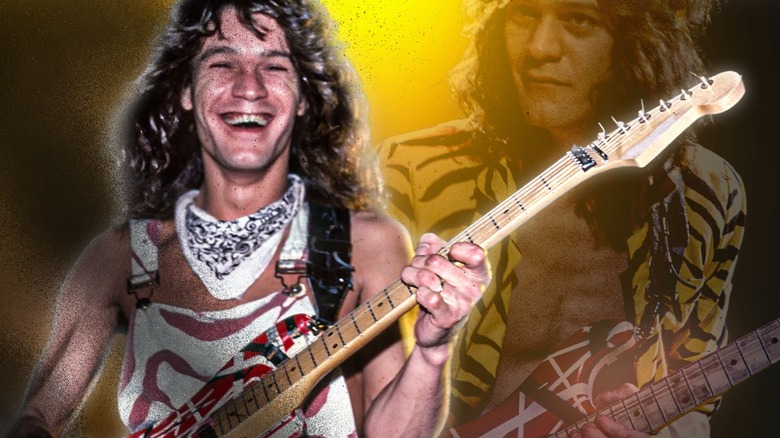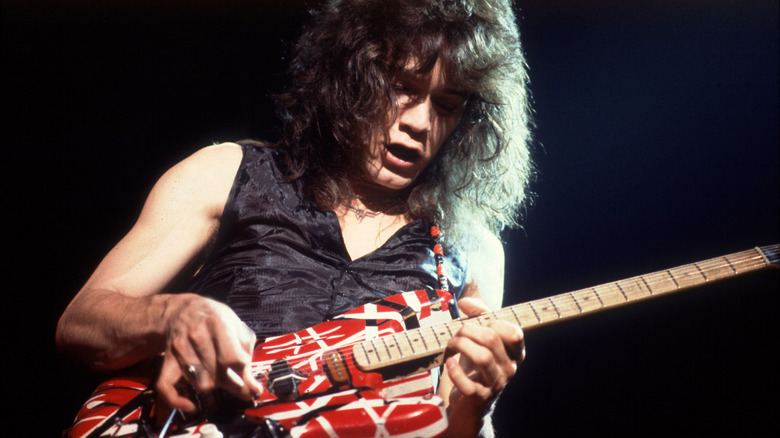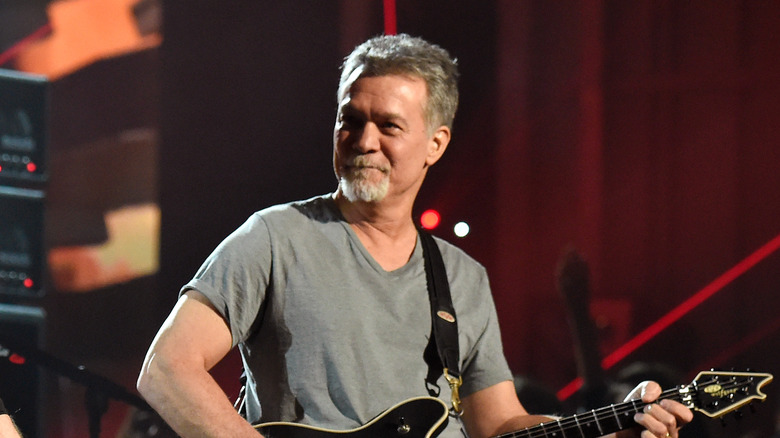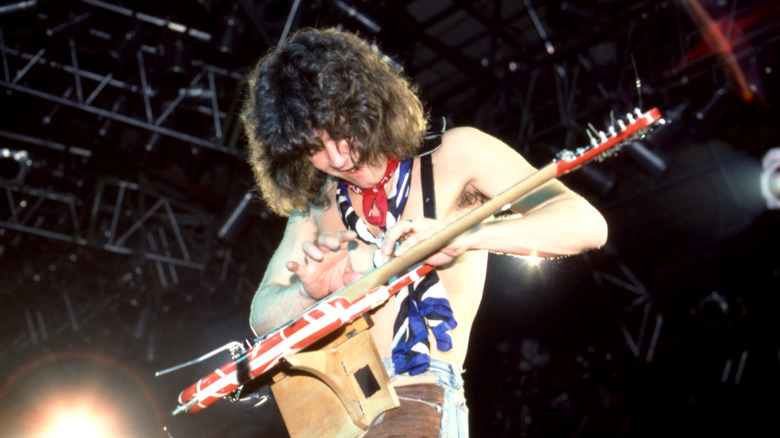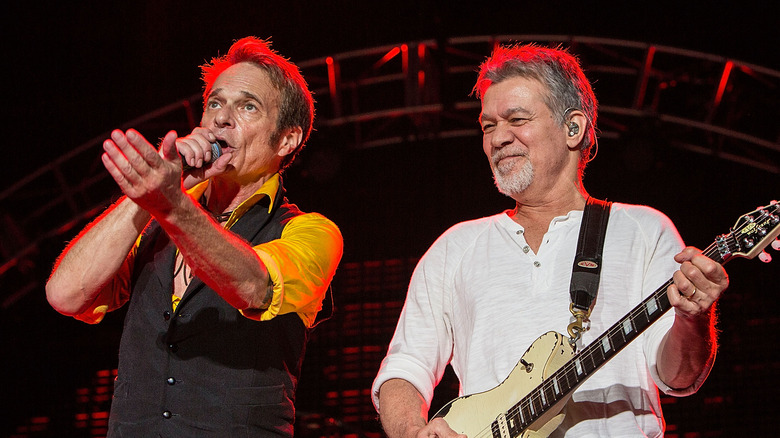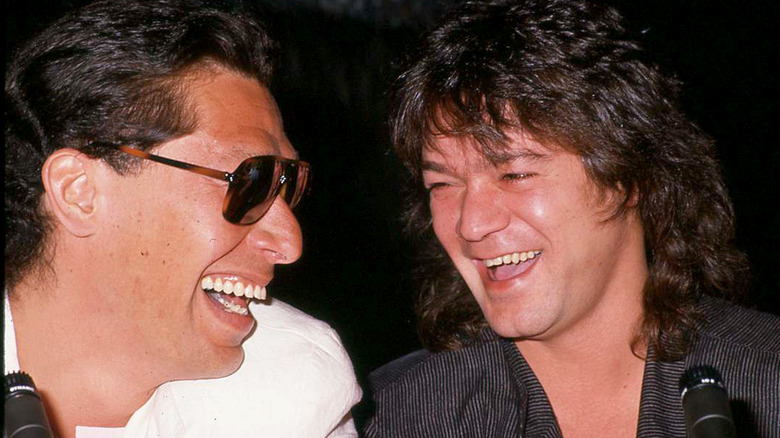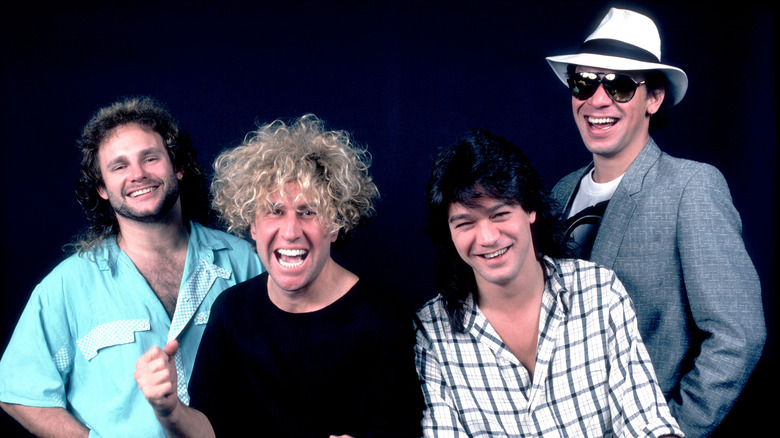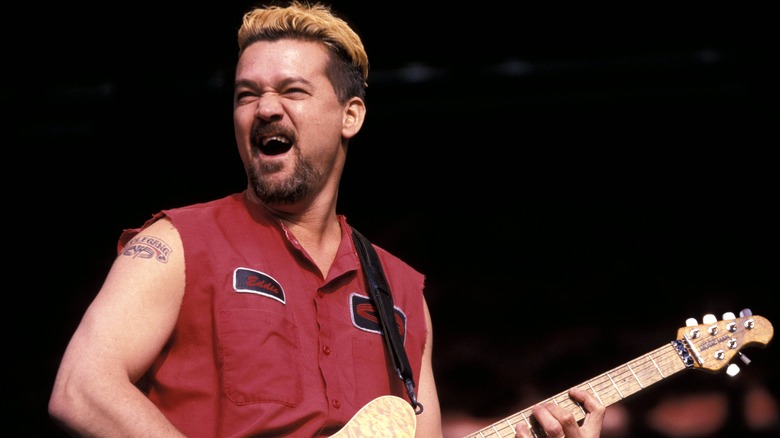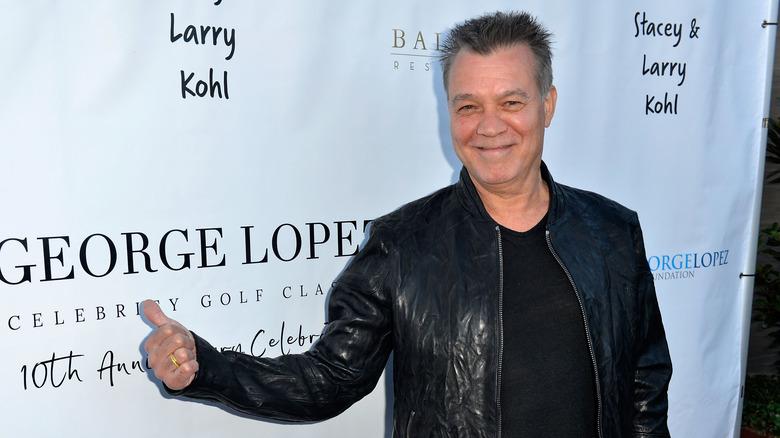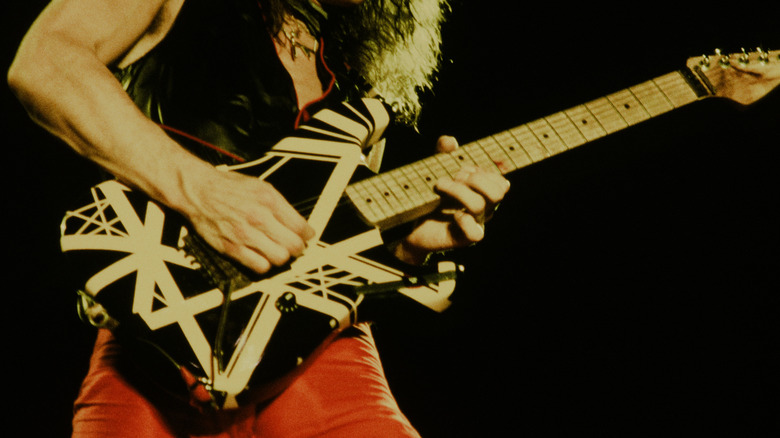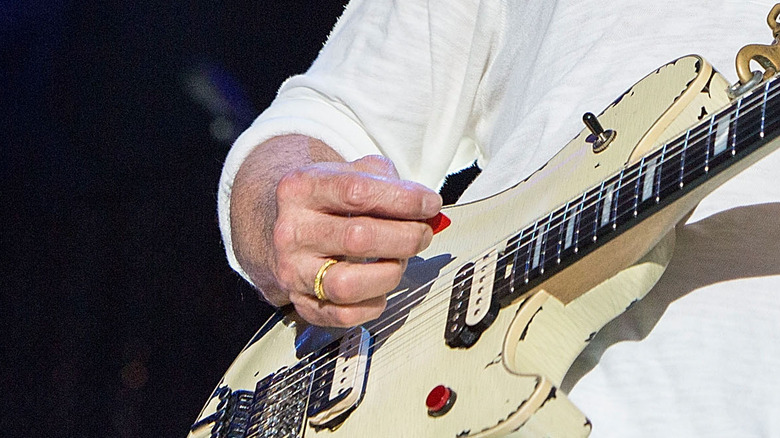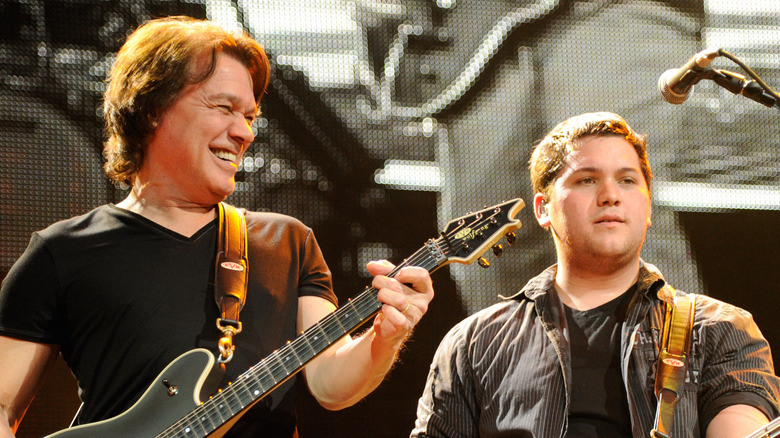Weird Things You Didn't Know About Eddie Van Halen
Eddie Van Halen is widely considered one of the greatest guitarists of all time. And the musician behind the pioneering rock band Van Halen led a life just as large as his talent. That sentiment was firmly enshrined when Van Halen sadly died at 65 in October 2020 from cancer-related complications, and now, when looking back over the rocker's career, one finds many unique twists and turns along the Van Halen's oft-tragic path to lionized rock heroism. You might even say they're pretty weird for a person who was a world-famous rock star.
Or were they? Because the higher a celebrity's star rises, it often seems the more they engage the strange, surreal, and outsized. And their early history sometimes mirrors the eccentricities of their public career. Van Halen is no exception; the ferociously talented guitarist has just as unlikely a backstory as any rocker, and his subsequent encounters and experiences as a guitar superstar could fill volume after volume of enthralling rock history.
In fact, you may be surprised at a few of the weird things that Van Halen did or said during his lifetime. Whether it be the guitarist's initial start on an entirely different instrument or, later in life, his getting in bed with the adult film industry — not to mention his own theory about how he got cancer — no one can convincingly say the musician was boring. Quite the opposite, to be sure, which probably is why there are so many weird things you didn't know about him.
Van Halen was bullied for not speaking English as a kid
When Eddie Van Halen and his lesser-known brother, future Van Halen bandmate Alex Van Halen, first arrived with their parents as immigrants to the U.S. from the Netherlands in 1962, English was not the young boys' first language. Subsequently, they had to endure all manner of bullying at the hands of school kids who viewed them as different. Unfortunately, the Van Halen brothers had already experienced similar oppression in their homeland.
During a 2015 audience Q&A at the Smithsonian's National Museum of American History in Washington D.C., Van Halen described his first day of school in America as "absolutely frightening," remembering a time when bullies would "tear up my homework papers, make me eat playground sand, and all these things." He had first experienced racism in Europe as the son of Dutch and Indonesian immigrants; across the pond in sunny California, the language barrier only proved further fodder for bullies.
Van Halen explained, "We already went through that in Holland — first day, first grade. Now you're in a whole [new] country where you can't speak the language, and you know absolutely nothing about anything. It was beyond frightening; I don't even know how to explain. But I think it made us stronger because you had to. The school that we went to [in the U.S.] was still segregated at the time, believe it or not. And since we couldn't speak the language, we were considered a minority."
Van Halen originally played piano
He would end up in the annals of guitar history, but early on in his youth, Eddie Van Halen began his musical journey with 88 black-and-white keys instead of six steel strings – on the piano — as did his brother and future Van Halen bandmate, drummer Alex Van Halen. Both were instructed in classical piano from a young age — starting roughly a year before the musicians, who were born in the Netherlands, moved to the U.S. with their family — and Eddie wound up mastering the instrument to such a degree that he won several consecutive piano competitions once the Van Halens arrived in Southern California.
"I never took guitar lessons, I took piano lessons, classical piano lessons from the age of six when we lived in Holland," Van Halen said in a 2009 interview (via Forbes). The rocker continued, "When we moved to America it was just the typical thing except I was really good at it, so was my brother. I actually won three years in a row at Long Beach City College, which had this contest thing they would put you in, it was a piano recital, they would put you in a room with three judges and you had a choice of one of three pieces of music to play."
Van Halen's piano playing came in handy in the long run — he contributed keyboards to several Van Halen hits, such as "Jump" and "Right Now."
Van Halen could never read music
During his lifetime, Eddie Van Halen readily admitted that he never learned how to read sheet music. This might seem like a contradictory trait for a professional musician, but the Van Halen guitarist shared this with several other famous rockers, such as Bob Dylan, Jimi Hendrix, and members of The Beatles.
But just like those icons, Van Halen had a finely trained ear that helped him mimic the sounds he heard and translate them to guitar. He did the same thing when he took piano lessons as a young boy, playing by ear and watching his instructor's finger movements to map out his performances. According to Van Halen's own words, he did it so effectively early on that he was able to pull the wool over everyone's eyes.
"Nobody ever knew that I couldn't read [music], not my teacher," Van Halen said in a Forbes interview. "I fooled everyone 'cause they always tripped. They're going, 'How come you're not looking at the sheet music?' The thing is, just like the guitar, I need to see what I'm doing. I can get away with whatever. I would prefer to see what I'm doing, and I always have to look at my fingers when I'm playing piano. And when I'd win these [childhood piano] contests, I had to see what I was playing. So I was just blessed with good ears."
Van Halen was given a special nickname by David Lee Roth
Amid their initial rise to stardom in the late 1970s, Eddie Van Halen had a unique nickname among his Van Halen bandmates: 'Vard. According to Van Halen singer David Lee Roth, the backstory behind the endearing moniker was one of family ties, coined in honor of Van Halen's mother, Eugenia.
However, Van Halen's special nickname also served a totally different purpose when the rock outfit was out on the road together — in conversation, it helped Roth and the group differentiate the guitarist from Roth's security guard at the time, who was also named Ed.
"We didn't call Eddie Van Halen 'Eddie,' we called him 'Vard,'" Roth recalled during a February 2023 episode of his podcast "The Roth Show." "That's because his mother used the Dutch expression; the way she said it was Dutch: 'Edvard! Edvard!' And we would call him 'Vard.' My security guy's name was Ed, and we called him 'Big' Ed."
He broke a band rule to play on Michael Jackson's Beat It
Eddie Van Halen found a whole new audience when he contributed the guitar solo to Michael Jackson's iconic 1982 "Thriller" track "Beat It," released as a single in early 1983. But it almost didn't happen at all, according to Toto keyboardist David Paich, who contributes synthesizers and arrangements to the album "Thriller." That's because Van Halen had a rule among the band members that no one would play on session material outside of the group.
Of course, as history shows, Van Halen bent the rule to become a part of the cultural behemoth that was a Jackson hit in the '80s. But it might not have happened for an entirely different reason — the fact that Van Halen initially thought it was a prank call when "Thriller" co-producer Quincy Jones first phoned him.
"Ed didn't wanna do it at first 'cause Van Halen had a 'no session' band rule — you can't play on other people's records," Paich said on a 2023 episode of the "Broken Record" podcast. "So [when Quincy called Van Halen] and said, 'This is Quincy Jones,' he goes 'Yeah, sure,' and hung up on him — Ed did. And he said, 'No, really, seriously.' So [Van Halen] sent a tape in, and they flew it in. He just soloed [on guitar], and they just took a piece of it and dropped it in."
Eddie played drums on Van Halen III instead of Alex Van Halen
Unknown to Van Halen fans upon its release, it later emerged that Eddie Van Halen played the drums on 1998's "Van Halen III," the band's only album with Gary Cherone as lead singer. Alex Van Halen, Van Halen's mainstay drummer, didn't contribute to the sessions due to personal issues — namely his second divorce.
However, in a respectful nod from Eddie, Alex is still listed as the drummer in the album credits. But "Van Halen III" producer Mike Post — also known as the TV composer behind the "Law & Order" theme and many others — made no bones about Alex's absence when asked about it in 2024. Speaking on an episode of "The Hustle" podcast, Post explained that Alex was drinking to excess during his messy divorce, the impact of which came to a head during a recording session at Eddie's recording studio.
As Post elaborated, "Al came in, and we started, and he just wasn't Al — he wasn't playing like Al. So, you know, Ed [was like] 'I don't know what to do, it's my brother, it's my brother.' And I said, 'Well, what do you want to do?' And he said, 'Well, I want him to think about himself and his family. And to get straight. And to figure things out. And get his divorce finished. But I ought to play drums.'"
His record label wanted him to change the name of his band at one point
It might sound crazy now, but Van Halen — the rock band so named for the unmistakable surname of its founding members, Eddie Van Halen and Alex Van Halen — almost changed the name of their group mid-career.
The name change was a proposal pushed by the group's record label — Warner Bros. Records, now known simply as Warner Records — when Van Halen first swapped lead singers in 1985, according to former Van Halen bassist Michael Anthony. That year, lead singer David Lee Roth left Van Halen to pursue a solo career, and the vocalist Sammy Hagar became the outfit's new singer. Certainly, it could have been a risky move, and the band wisely decided not to take it.
"Warner Bros. wanted us to change the name of the band because they had a feeling that if Dave ever returned, you know — they thought that was such a strong identity," Anthony explained on "Steve Gorman Rocks!" in 2021. "I remember Eddie and Alex, we were at Warner Bros., and they were yelling, going, 'Hey, hey, this is our last name, this is our careers, and this is it — Van Halen.'"
Van Halen once played his guitar with a power drill
Van Halen listeners heard an unusual sound when they first put on the band's 1991 studio album, "For Unlawful Carnal Knowledge." The opening track, the powerful Sammy Hagar-fronted rocker "Poundcake," begins with something that sounds like an overpowered dentist's drill subtly morphing into Eddie Van Halen's unmistakable guitar power chords. That's because the sound indeed comes from a drill — a power drill, to be exact.
While experimenting in the recording studio, Eddie and his audio engineer happened to devise the aggressive, uncharted guitar sound by having Eddie "play" his guitar with a power drill, specifically by placing the tool close to his guitar's pickups. What then emanated from the speakers is now a canonized rock intro among the Van Halen devout. Subsequently calling the experiment a "goofball little thing," Eddie addressed his power drill playing in Kevin Dodds' "Edward Van Halen: A Definitive Biography." The guitarist explained, "The motor of the drill got picked up by my guitar pickup just like a microphone. I turned my volume on and it sounded like kickstarting your engine."
In 2015, Eddie explained further in response to a question about the power drill on his official EVH Gear website, revealing that the drill was left sitting around by the studio maintenance technician, Ken Deanne, which led to Eddie picking up the tool and putting it to use. Eddie ended up using the same drill when Van Halen played the song live in concert.
He contributed music to an adult film
In 2006, Eddie Van Halen worked with his friend and director Michael Ninn to write and perform two songs for Ninn's adult film "Sacred Sin." The pair of tunes — "Rise" and "Catherine" — didn't receive billing as official Van Halen releases but were instead solo instrumental tracks from the Van Halen guitarist. As a bonus, the two-disc DVD release of "Sacred Sin" boasted music videos for both tracks.
Seemingly defending the collaboration at the time, Van Halen told the adult video trade magazine AVN, "I'm working with a friend, very simple. I like his work. Michael Ninn is like a Spielberg to me — the imagery, the way he makes things look just sensual. [...] We hooked up, I ended up doing the music, and it's some whompin' a** s***. I think it's the best work he's ever done, and me too. And more to come."
That same year, Ninn told AVN that "Sacred Sin" was aimed at the couples market but promised a non-explicit version of the movie to come under the alternate title of "Rise." However, that version of the film seemingly remains unreleased.
Van Halen let another famous guitarist be buried with an iconic Van Halen guitar
There is a touching story that shows the type of respect that Eddie Van Halen had for other pioneering rock and metal guitarists: He gifted one of his notable Van Halen guitars to the late Pantera guitarist "Dimebag" Darrell Abbott to be buried with Abbott at the rocker's funeral, according to Abbott's former partner, Rita Haney.
Abbott tragically died in 2004 when he was murdered onstage during a performance by his post-Pantera band, Damageplan. For guitar enthusiasts, Van Halen was known for his guitars striped in crisscrossing red, white, and black layers. But Abbott had always preferred Van Halen's black and yellow striped guitar, as pictured on the back cover sleeve of 1979's "Van Halen II."
"I remember talking with [late Pantera drummer] Vinnie [Paul Abbott], trying to decide what guitar to bury him with," Haney recalled to Billboard in 2014. "Three hours later, Eddie called to see if he could do anything for us and for Dime. [...] So I asked him if he'd stripe up a guitar for Darrell. He said, 'One of the red, white, and black ones?' And I said, 'No, Darrell always said that the yellow and black was your toughest guitar!'" And Van Halen gladly obliged with the axe, saying, "An original should have an original," according to Haney.
Van Halen theorized he got cancer from guitar picks
Eddie Van Halen never hid the fact that he had a history of tobacco smoking along with drug and alcohol misuse. The Van Halen guitarist entered a drug rehabilitation program in 2007 and shared that he had achieved several years of sobriety in 2015. But the rocker also harbored an interesting theory about how he may have first acquired cancer when he began receiving treatment for tongue cancer in 2000. Van Halen publicly speculated that it was because he frequently held the metal guitar picks he used in his mouth.
"I used metal picks — they're brass and copper — which I always held in my mouth, in the exact place where I got the tongue cancer," Van Halen told Billboard in 2015. "Plus, I basically live in a recording studio that's filled with electromagnetic energy. So that's one theory. I mean, I was smoking and doing a lot of drugs and a lot of everything. But at the same time, my lungs are totally clear. This is just my own theory, but the doctors say it's possible."
Van Halen's tongue cancer surgery in the early 2000s reportedly removed a third of his tongue, and in 2002, he was declared free of the disease. Ultimately, however, complications from cancer would take the guitarist's life — he was subsequently treated for both lung and throat cancer before he died in 2020.
If you or anyone you know needs help with addiction issues, help is available. Visit the Substance Abuse and Mental Health Services Administration website or contact SAMHSA's National Helpline at 1-800-662-HELP (4357).
His son's band uses Eddie Van Halen's original band name
Eddie Van Halen's son, Wolfgang Van Halen, is now the leader of his own rock band, Mammoth WVH, so named in honor of Wolfgang's father and Van Halen's music. When Van Halen was still a fledgling act in Southern California in the early 1970s, one version of the proto-Van Halen group — with Van Halen on vocals and original bassist Mark Stone, prior to singer David Lee Roth joining up — went by the band name Mammoth. Subsequently, Wolfgang added his initials to the moniker for a slight twist to make it his own.
"Since I was a kid, my dad would tell me the story of the band, and that it was called Mammoth," Wolfgang told Billboard in 2021. "It was a three-piece with dad singing, so that's another connection I have with it. Just growing up, I was like, 'That's the coolest name! When I grow up, I want to call my own band that.' And here we are."
Unsurprisingly, apart from being close as family, Eddie and Wolfgang were also close musically. In 2007, when he was still only 16, Wolfgang supplanted Michael Anthony as the bass player in Van Halen after Anthony had served a long tenure with the group through their most impactful years. Van Halen essentially disbanded in 2020 following Eddie's death; Wolfgang premiered his new band later that same year with a debut single dedicated to the memory of his dad, "Distance."
